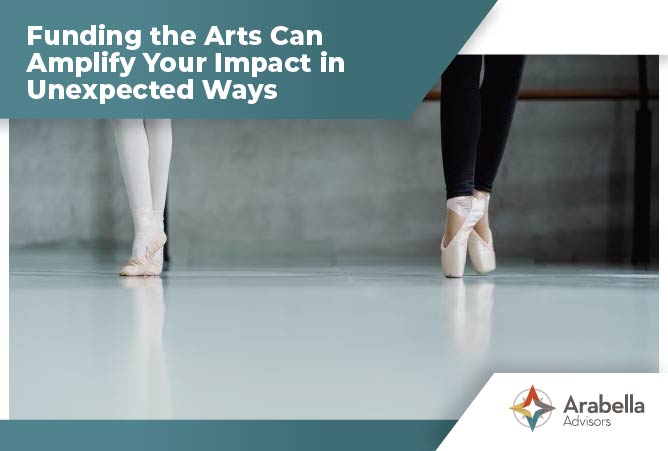Funding the Arts Can Amplify Your Impact in Unexpected Ways

This post was originally published on LinkedIn
Over the course of this year, we’ve faced astounding challenges—a global pandemic, a reckoning for racial justice, the erosion of our democracy, disrupted education for millions, and destructive wildfires and hurricanes. The philanthropic community has responded with rapid-response support and deep reflection on how it wants to reshape the sector. As we look to end this year, many donors are rethinking their end-of-year giving, which may have in the past included art institutions, programs, and organizations in their communities. Many may be weighing diverting some of that giving to other immediate causes. While it may make sense to rebalance your end-of-year—and 2021—portfolio, I would urge donors to consider how integral the arts are to the most pressing challenges of our time.
While arts funding may be a separate line item in your grant-making budget, support for the arts amplifies most every issue donors care about from education to mental and physical health, workforce development, economic growth, and more.
My appreciation for arts and culture as essential elements in building community was forged during my tenure at the renowned LA-based Inner-City Arts, where I came to understand the importance of visual and performing arts as a catalyst for powerful dialogue. The arts empower communities and meaningfully contribute to civic life for all people, especially children.
I saw the power of the arts to change lives: Students learned by doing and saw the potential of the arts in an ever-changing world. The practice of creating a visual or performing art piece transformed their view of what was possible, instilled confidence, and honed critical thinking and communication skills. Specifically:
- Research has shown the arts to level the “learning field” across socioeconomic boundaries and unlock academic potential, especially those from underserved public schools.
- The arts engage students in learning that matters to them, which is essential for deep understanding and self-directed learning.
- Recent research has also found that arts programs create important learning pathways for children and increase their writing skills, communication abilities, and engagement in school.
- Learning in the arts correlates positively with feelings of success.
Arts programs are more than a sound investment for funders interested in educational outcomes. They are also vital to advancing the goals of those who support workforce development. LinkedIn recently pinpointed the soft skills companies need most: creativity topped the list. The arts are economic drivers. According to the 2020 Otis Report on the Creative Economy, Los Angeles County’s creative industries generated 797,075 jobs, $67.0 billion in labor income, and $203.2 billion in annual output.
Arts and creativity contribute to emotional well-being. Instinctively, this is a universal understanding. However, life in our pandemic reality, where depression and anxiety are on the rise, has magnified the need to advance research on the intersection of the arts on public health, especially among communities of color. New and important studies of this issue have begun with the exciting launch of a research lab at the University of Florida, focused on the long-term health benefits of engaging with the arts and the potential public policy outcomes that would be benefit all Americans.
In fact, it would be hard to find an issue donors care about that can’t, in some ways, be helped by the arts. Perhaps that is because of the very nature of the arts – they reflect who and where we are and who and we aspire to be.
The true beauty of the arts is that their impact can be both highly personal and profoundly universal. I’d be delighted to hear from you about how the arts have amplified your philanthropic goals or questions you have about funding the arts.
Sharyn Church is Arabella Advisors’ Los Angeles-based managing director. She helps to lead the firm’s work with philanthropists, impact investors, and social entrepreneurs across a broad range of issues—from education to health care to the environment to social justice. She serves on the board of P.S. Arts.
